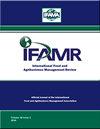巴西柑橘部门国际和国内价格之间的价格传递
IF 1.5
4区 经济学
Q3 AGRICULTURAL ECONOMICS & POLICY
International Food and Agribusiness Management Review
Pub Date : 2021-12-16
DOI:10.22434/ifamr2020.0156
引用次数: 2
摘要
橙汁连锁店是巴西农业综合企业的代表性部门,其业绩值得分析,以确定提高其竞争力的战略。分析食品价值链的不对称性是非常重要的,因为它提供了有关市场结构和绩效的有价值的信息。本文采用非对称阈值误差修正模型,考察了巴西橙子国际价格向国内价格传导的阈值、短期和长期不对称性。我们在分析中使用了1996年1月至2020年12月期间国际冷冻浓缩橙汁价格和巴西国内橙子价格的月度数据。我们发现了短期和长期价格传导的阈值和不对称的证据,以及巴西国际和国内橙子价格之间长期关系的不对称调整。国际价格的下降导致销售利润的减少,这很快就会转嫁到国内价格上,但国际价格的上涨却并非如此。我们讨论了对巴西柑橘产业的影响。本文章由计算机程序翻译,如有差异,请以英文原文为准。
Price transmission between international and domestic prices in the Brazilian citrus sector
The orange juice chain is a representative sector of the Brazilian agribusiness sector and its performance warrants analysis to identify strategies to enhance its competitiveness. Analysis of asymmetry in food value chain is important because it provides valuable information on market structure and performance. We use an asymmetric threshold error correction model to examine threshold, short- and long-run asymmetries on price transmission from international to domestic prices of oranges in Brazil. We use monthly data on international frozen concentrated orange juice prices and domestic prices of oranges in Brazil for the period from January 1996 to December 2020 in the analysis. We find evidence of threshold and asymmetries in short- and long-run price transmission and asymmetric adjustment towards a long-run relationship between international and domestic orange prices in Brazil. Decreases in international prices that lead to reductions in marketing margins are passed on quickly to domestic prices, but this is not the case for increases in international prices. We discuss implications for the Brazilian citrus industry.
求助全文
通过发布文献求助,成功后即可免费获取论文全文。
去求助
来源期刊

International Food and Agribusiness Management Review
AGRICULTURAL ECONOMICS & POLICY-
CiteScore
2.90
自引率
0.00%
发文量
0
审稿时长
>12 weeks
期刊介绍:
The IFAMR is an internationally recognized catalyst for discussion and inquiry on issues related to the global food and agribusiness system. The journal provides an intellectual meeting place for industry executives, managers, scholars and practitioners interested in the effective management of agribusiness firms and organizations.
IFAMR publishes high quality, peer reviewed, scholarly articles on topics related to the practice of management in the food and agribusiness industry. The Journal provides managers, researchers and teachers a forum where they can publish and acquire research results, new ideas, applications of new knowledge, and discussions of issues important to the worldwide food and agribusiness system. The Review is published electronically on this website.
The core values of the Review are as follows: excellent academic contributions; fast, thorough, and detailed peer reviews; building human capital through the development of good writing skills in scholars and students; broad international representation among authors, editors, and reviewers; a showcase for IFAMA’s unique industry-scholar relationship, and a facilitator of international debate, networking, and research in agribusiness.
The Review welcomes scholarly articles on business, public policy, law and education pertaining to the global food system. Articles may be applied or theoretical, but must relevant to managers or management scholars studies, industry interviews, and book reviews are also welcome.
 求助内容:
求助内容: 应助结果提醒方式:
应助结果提醒方式:


